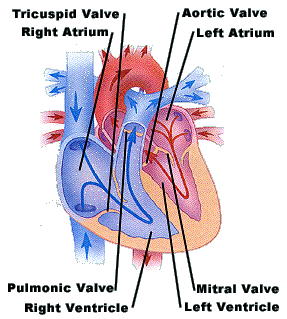Heart Failure
The heart is responsible for pumping blood (and oxygen) to the body tissues and removing waste. Heart failure is the inability of the heart to adequately perform these functions. There are many causes of heart failure in dogs. Fibrosis of the mitral valve is the most frequent cause. In this disease, the valve that separate the left atrium from the left ventricle becomes distorted. Blood leaks from the left ventricle into the left atrium when the heart contracts (beats).
Other causes of heart failure in dogs include:myocarditis
endocarditis
heartworm disease
cardiomyopathy
endocardiosis
congenital problems
During the early stages of heart failure, the body tries to compensate. The heart muscle (particularly the left ventricle muscle) thickens and enlarges. This allows the heart to pump an increased amount of blood through the circulatory system. Eventually the failing heart cannot handle the situation and blood backs up. Fluid leaks into body tissues and the lungs. This condition is called edema.

Symptoms of heart failure depend upon the severity of the condition. Some symptoms include:weakness and fatigue, particularly after exerciseswelling of the abdomen and limbscough and shortness of breathpoor appetitevomiting and diarrhea.
X-rays, laboratory tests, ECG, and cardiac ultrasound are useful and necessary for diagnosing heart disease. Your veterinarian will recommend some (or all) of these tests.
The prognosis for heart disease depends upon the severity of the condition. Medication is generally required for the rest of the animal's life.
[ Search Articles ] [ Article Index ] [ Previous Page ]



770-476-3317